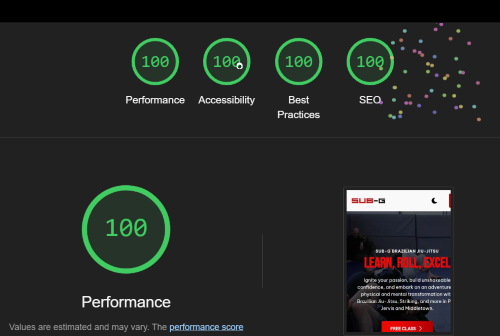
Why Every Business Needs a Website: Boost Visibility, Credibility, and SEO
The Crucial Role of a Website in Today’s Digital Business Landscape
The difference between a business that has a website and one that doesn't is much more significant than most realize. To business owners unfamiliar with the impact a website can have, it can appear like just another marketing expense. However, it is important to look at a website not as an expense, but instead as an asset. Assets are anything that provides value to a company or individual. As long as a website brings in more value than it uses up, it's worth having. Unlike other marketing tools like billboards and TV ads, a website's impact can be everlasting, and more importantly, accessible at any time from any place. Let's look into some other ways a website can be a game changer for businesses of all sizes.
Added Visibility For Businesses
The days of getting business strictly via word-of-mouth are all but gone. When consumers need something done, there's only one place that almost all of them go: Google. Finding 50 different landscapers in one's general area is now only a few clicks away. However, with all these options at customers’ fingertips, the process of weeding out the good from the bad becomes more difficult. This is where a strong web presence can be the deciding factor in whether a prospective client reaches out or not. Ultimately, the decision will likely come down to two factors: a high quality website and good reviews.
1. Lots Of Good Reviews
Having 5 or 10 good reviews on a Google Business Profile unfortunately doesn’t cut it. Prospective customers don’t just want to see good reviews; they want to see lots of them. The larger the sample size, the more likely the good reviews are the trend rather than the exception. Google knows this just as well as its users, and as such, gives preference to businesses with more good reviews. Google gives this preference in the form of higher search engine rankings. Search engine rankings are arguably the cornerstone of search engine optimization. Interested parties are unlikely to scroll through 10 or more business profiles; heck they might not even look past the first three that Google offers. For that reason alone, it is vital that businesses take advantage of the power of reviews to boost their search engine rankings.
The difference between a business with ten 5-star reviews and one with thirty or even forty is immense in the race to the top of Google (study/article link). It can be as simple as asking customers for a review after purchase or sending them an email after the fact. Businesses that make the relatively small effort to ask customers for reviews can easily get well beyond the forty mark, drastically improving search engine rankings.
2. A High Quality Website
In their core vitals update released in March of 2024, Google made it clear that they would rank a faster performing website over one with equal on-page SEO and reviews. That means that a website that takes 2 seconds to load versus one that only take 1 second to load can be the difference between the top spot on Google and the number two spot. It’s not enough to simply have a well designed website that reflects the unique brand identity of a business. It is the performance under the hood, what potential customers don’t see, that makes the difference in a website. It’s worth noting that a beautifully designed website is worthless if potential customers click away from it before it even loads. That is why load times are so important. Studies have shown that an astounding 47% of customers expect websites to load within 2 seconds, meaning many will look for an alternative if this threshold is not met.
There are a few different ways to assess the load speeds of a website. The best and most frequently used is Google’s PageSpeed Insights which is totally free to use. Simply copy and paste the link of any website into the input box and it will return the performance, accessibility, best practices, and SEO scores. While these scores are technically estimates and not the exact figures that Google looks at when determining search engine rankings, they can give a good sense of where a website stands in terms of performance. Having scores of 100 for accessibility, best practices, and SEO should always be a given. These categories are easy to perfect and require very little in terms of quality. The performance score is the most important piece of the puzzle as this essentially says the loading speed of the site. Even the best and most professional looking sites are often bloated with unnecessary code that slows down load times and results in a performance score below 40!

Added Legitimacy For Businesses
Beyond the technical benefits of a good website are the trust, credibility, and brand authority it helps build with potential customers. Websites are a one stop shop for all things to do with a business. Sure one can put photos on Facebook and contact information on a Google Business Profile, but a website provides one spot for everything. It’s also worth noting for the businesses that rely on a Facebook page for their web presence, that not everyone has a Facebook account or is willing to sign up for one. They’ll simply skip right over those listings and move on to one that has a website with the information they need.
Furthermore, there’s only so much business information that can be put on a Google Business profile or Facebook page. A website is not limited in number of pages or length of said pages. There’s an unlimited area to build trust and credibility as one sees fit. Something as simple as an “About Us” page with pictures of staff and owners can help to put faces to the name and instill comfort and trust in potential customers. When it comes time for prospects to decide on who they want to reach out to, trust is the name of the game. This also goes hand in hand with having lots of good reviews as previously discussed.
Having a sleek and easy to navigate area for photos of past work is also important in helping prospective customers to get a sense of the type and quality of a business’s work. Don’t make them run around Google and Facebook to find photos. Offer the ease and accessibility of a one stop shop for photos.
Useful Data Insights
Once a website is set up and online, tools like Google Analytics can be used to track its traffic on the internet. Having the ability to see which pages or services are being viewed the most by customers can provide clarity on what is popular and what could use some work. This data can guide decisions about content updates, new offerings, or marketing strategies, helping to refine the overall user experience.
Beyond just tracking visits, these analytics tools also offer deeper insights into customer demographics, time spent on pages, and conversion rates. This level of detail empowers businesses to optimize their website continuously, ensuring it not only attracts visitors but also converts them into loyal customers. With the right adjustments based on these insights, a website becomes a dynamic tool for growth rather than just a static online presence. And the best part of it all—Google Analytics is completely free!
Simple And Cost-Effective Advertising
A website provides an incredibly cost-effective way to promote your business compared to traditional advertising methods like print, radio, or TV. While these forms of advertising often require substantial, recurring investments, a website offers a one-time setup cost with the ability to update and refine content as needed. Once your site is live, you can consistently market your products or services without the need for additional spending. This makes it an attractive option, particularly for small businesses with limited marketing budgets.
Additionally, digital marketing tools such as SEO (Search Engine Optimization) and content marketing can be integrated seamlessly into your website, allowing you to attract more visitors without the ongoing expense of paid ads. By investing in SEO strategies, for example, you can increase your website’s visibility on search engines like Google, driving organic traffic without paying for every click, as you would with pay-per-click (PPC) advertising. Over time, this builds a sustainable flow of traffic that continues to benefit your business long after the initial investment.
Moreover, a website’s flexibility allows you to experiment with different approaches to marketing without the financial risk associated with traditional methods. Whether you want to launch a new product, announce a sale, or share informative content through a blog, you can do so at little to no extra cost. Unlike a billboard or print ad that may become outdated quickly, your website can be continually updated and refined to align with your current business goals and promotions.
Conclusion
In conclusion, a website is far more than just a digital brochure; it's a long-term asset that can significantly impact a business's success. From improving visibility and rankings on Google to enhancing credibility and trust with potential customers, a well-designed and optimized website can give businesses an edge in today's competitive market. It allows businesses to showcase their products or services, gather valuable customer insights, and even outperform competitors through faster load times and SEO strategies. The benefits are both immediate and lasting, providing a platform that is accessible to customers 24/7 from anywhere in the world.
Ultimately, the value of a website is reflected in its ability to bring in more than it costs. It acts as a versatile marketing tool, one that can continuously adapt and evolve with the needs of the business. Whether through building trust, gathering positive reviews, or offering a user-friendly experience, the right website can be the difference between being noticed and being overlooked. In an age where online presence matters more than ever, investing in a quality website is one of the smartest decisions a business can make.



